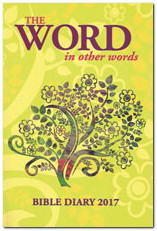THE WORD
FIRST READING: Nm 6, 22-27
The LORD said to Moses: "Speak to Aaron and his sons and tell them:
This is how shall bless the Israelites. Say to them: The LORD bless you and keep you! The LORD let his face shine upon you, and be gracious to you!
The LORD look upon you kindly and give you peace! So shall they invoke my name upon the Israelites, and I will bless them."
SECOND READING: Gal 4, 4-7
Brothers and sisters:
When the fullness of time had come, God sent his Son,
born ofa woman, born under the law, to ransom those under the law,
so that we might receive adoption as sons. As proof that you are sons,
God sent the Spirit of his Son into our hearts, crying out, "Abba, Father!"
So you are no longer a slave but a son, and if a son then also an heir, through God.
GOSPEL: Lk 2, 16-21
The shepherds went in haste and found Mary and Joseph, and the infant lying in the manger. When they saw this, they made known the message that had been told them about this child. All who heard it were amazed by what had been told them by the shepherds.
And Mary kept all these things, reflecting on them in her heart. Then the shepherds returned, glorifying and praising God for all they had heard and seen, just as it had been told to them.
When eight days were completed for his circumcision, he was named Jesus, the name given him by the angel before he was conceived in the womb.
IN OTHER WORDS
A story is told of a mother who, when she discovered that her two children who lived in the same town were rarely seeing each other, decided to write them letters, with the first page sent to one, and the second page to the other. It then forced the two siblings to spend time together so they could read their mother's letters in full. Only a mother could think of a solution like that!
Today is the solemnity of Mary, the Mother of God and the first day of the year. This underlines our high regard for Mary, as well as our desire to receive her prayerful and loving intercession as we begin the year.
Theological discussions about Mary as Mother of God (Mater Dei in Latin,Theotokos in Greek) are not in short supply. For many years, the Catholic Church has fought off ideas which undermine the woman who gave birth to our Savior and fail to grasp her sublime dignity in relation to the divine identity of her Son. Some Christian denominations of today who continue to deprive Mary of such privileged status are simply echoing the fifth century Nestorian doctrine.
The importance of calling Mary as the Mother of God and celebrating her solemnity on the first day of the year goes beyond theological bounds. It certainly presents a powerful spiritual symbolism with great existential value. A new year connotes fresh start and hope for what is to come.We might have a thousand questions about what is in store for us individually and collectively as a human family. News headlines and year-end polemics about politics, global warming, regional wars and violent conflicts, extremism, and social injustices have made many people cynical about the future of humanity. Often we are clueless about how to start the year.
Today's gospel says that Mary kept and reflected things in her heart. This could be a good way to start. It worked for Mary, it should also work for us. Doing so, we need to surrender our will to God, trust in His mercy, and allow the Spirit to direct our thoughts and transform us.
Being a mother, Mary would always find solutions to our predicaments and intercede for us, the way she did for Christ her Son. Our situation is familiar to her: Facing the unknown and weathering the fiercest storm of human tragedy. At the start of the year, we call on the Lord's Mother so that, using the text from the first reading, she would pray: "May the Lord let His face shine upon you, and be gracious to you; may the Lord look upon you and give you peace" (Nm 6:22-27).
- Fr. Sisoy Cellan, SVD (Kenya)
The Word in other words 2017
The Word in other words 2017
The Word in other words 2017
An annual project of Logos Publications, The WORD in Other Words Bible Diary contains daily scripture readings and reflections written by priest, brothers, and sisters of the three congregations founded by St. Arnold Janssen (the SVD, SSpS, and SSpSAP). It hopes to serve as a daily companion to readers who continually seek the correlation of the Word of God and human experience.

|
Production : Fr. Carlos Maria de Guzman, Jr., SVD and Staff of Logos Publications |
| Cover Design : Malou E. Domingo |
| Liturgical Calendar : Fr. Atilano Corcuera, SVD |
| Production Consultant : Fr. Gerardo del Pinado, SVD |
| Scriptural Texts : New American Bible and Daily Roman Missal |
| Cover artwork based on photos by Fr. Bar Fabella, SVD |
| Published by : Logos Publications, Inc. 1916 Oroquieta St., Sta. Cruz, Manila |
| Email Address: This email address is being protected from spambots. You need JavaScript enabled to view it. |
| Telephone : +63 2 711 1323 |
| Fax : +63 2 732 273 |
| Copyright © 2016 Society of the Divine Word |



